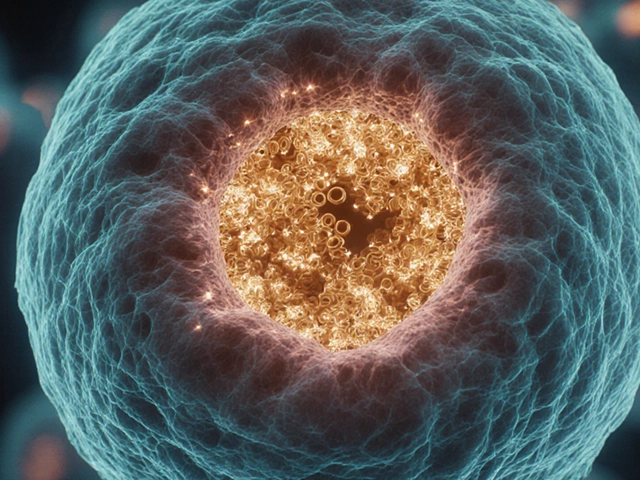When people talk about mental illness, many assume depression or anxiety tops the list of the most brutal types. But schizophrenia, with its profound impact on everything from thought processes to everyday interactions, often takes that notorious title. This condition is infamous for its challenging symptoms, including hallucinations, delusions, and cognitive difficulties that complicate the simplest daily tasks.
Schizophrenia isn't about having a 'split personality.' It's a chronic brain disorder that profoundly distorts how a person thinks, feels, and behaves. The severity and nature of symptoms vary, but they can seriously impair one's ability to function, work, and maintain relationships. Imagine trying to focus on a conversation when you hear voices no one else does.
Understanding schizophrenia helps us better support those affected, shedding light on what life is truly like living with such a condition. Whether you're trying to help someone you know or simply want to learn more, let’s break down what makes this illness so tough and explore practical ways to manage it.
- Introduction to Schizophrenia
- Symptoms and Challenges
- Impact on Daily Life
- Myths and Misconceptions
- Therapy and Treatment Options
- Coping Strategies for Individuals and Families
Introduction to Schizophrenia
Schizophrenia might sound complicated, but at its core, it's a mental illness that affects how a person interprets reality. Imagine waking up every day and not being able to trust what you see or hear. That's everyday life for many individuals battling schizophrenia.
Schizophrenia often begins in early adulthood, though it can sometimes emerge earlier. For most people, it doesn't kick in until they're in their late teens or early twenties. It affects about 1% of the population globally, meaning it’s more common than you might think.
Understanding the Symptoms
The symptoms of schizophrenia fall into a few categories:
- Positive symptoms: These include hallucinations (seeing or hearing things that aren't there) and delusions (believing things that are irrational or untrue).
- Negative symptoms: These are more about what's missing, like a lack of motivation or reduced ability to express emotions.
- Cognitive symptoms: These involve trouble focusing, memory issues, and difficulties in making decisions.
Such symptoms can change over time, sometimes improving and then worsening, which can make life unpredictable for those dealing with mental illness.
Dispelling Myths
A big part of understanding schizophrenia is kicking myths to the curb. It's not a 'split personality' disorder, despite what many movies might suggest. It's also not always a violent condition; in fact, most people with schizophrenia are more likely to be victims of violence than perpetrators.
By understanding these facts, we can better empathize with those who have schizophrenia, helping to create a world that's more understanding and supportive for everyone.
Symptoms and Challenges
Living with schizophrenia is like navigating a maze with shifting walls. The most recognizable symptoms disrupt everyday life and can be tough to handle. We're talking about hallucinations, delusions, and serious cognitive issues that affect how someone thinks and interacts with the world.
Understanding the Symptoms
The symptoms generally fall into three categories: positive, negative, and cognitive. Positive symptoms are 'extra' feelings or behaviors that aren't usually present, such as hallucinations or hearing voices that aren't really there. Delusions are another type—fixed false beliefs that don't align with reality, like thinking you have superpowers.
Then there are the negative symptoms, which reflect an absence of normal functions. This could mean reduced emotional expression, lack of motivation, or difficulties in beginning and sustaining activities. Lastly, cognitive symptoms affect memory and attention, messing with the ability to make decisions or focus.
The Daily Challenges
Imagine trying to hold a job when you can't concentrate for more than a few minutes. Or keeping friendships when you're not sure what's real and what's not—these are the kind of challenges folks with schizophrenia face. It's not just about managing the symptoms. There's a whole social aspect too.
| Symptom Type | Example |
|---|---|
| Positive | Hearing voices |
| Negative | Lack of emotion |
| Cognitive | Memory issues |
One big issue is the stigma surrounding this illness. People often don't get why someone with schizophrenia behaves a certain way. Offering education and understanding can go a long way in reducing these barriers and leading to more compassionate interactions.
Knowing these symptoms and challenges helps us appreciate how critical mental health therapy is for those affected. With the right support—be it medication, therapy, or community support—these challenges can be managed more effectively.
Impact on Daily Life
Schizophrenia can dramatically alter a person's daily life, creating hurdles in areas most people take for granted. Imagine waking up one morning, eager to start your day, but feeling overwhelmed by voices that aren’t there. It’s disorienting and exhausting, to say the least.
One major area where schizophrenia hits hard is social interactions. People with schizophrenia may struggle to communicate effectively, leading to misunderstandings or strained relationships. Conversation can feel like a minefield, where interpreting social cues becomes a daunting task.
Work and Productivity
Holding down a job isn't easy when battling mental health disorders, especially schizophrenia. Tasks that require focus, like following instructions or meeting deadlines, can be particularly challenging. For some, symptoms can make it nearly impossible to maintain regular employment.
| Area | Challenge |
|---|---|
| Work | Difficulty in maintaining concentration and following tasks |
| Social Life | Struggles with communication and misinterpretation of social cues |
| Daily Activities | Challenges in managing routines due to disorganized thinking |
Managing Daily Tasks
Imagine the cognitive disarray in routine tasks like grocery shopping. Planning and decision-making become laborious when your mind feels clouded by intrusive thoughts or paranoia.
Emotional and Physical Well-being
Beyond the mental hurdles, schizophrenia can also affect physical health. Sleep disturbance, weight gain from medication, and lack of motivation can lead to a downward spiral, further impacting overall well-being.
These impacts underscore the importance of effective therapy and treatment plans, which can help manage symptoms more effectively, paving the way toward a more balanced life.

Myths and Misconceptions
When it comes to mental illness, especially schizophrenia, myths and misconceptions abound, making it even harder for those affected to get the support and understanding they need. Some stuff people think is just way off.
Schizophrenia is the Same as Split or Multiple Personality Disorder
This one is a classic misunderstanding. Schizophrenia has nothing to do with having multiple personalities, also known as Dissociative Identity Disorder. Instead, it's more about the mind having trouble distinguishing between reality and imagination, leading to hallucinations and delusions.
People with Schizophrenia are Violent
Another stereotype is that individuals with schizophrenia are dangerous. In reality, they are more often victims of violence than perpetrators. Most people with schizophrenia are non-violent and prefer staying away from conflict.
Schizophrenia Cannot be Treated
While schizophrenia is a severe and chronic illness, with the right therapy and medication, individuals can lead meaningful lives. Advances in medical science have made it possible to manage symptoms effectively.
Only Genetics Play a Role
While genetics can influence schizophrenia, they aren't the sole factor. Environmental triggers like stress, trauma, and substance abuse can also play significant roles in its development.
| Myth | The Reality |
|---|---|
| Violent Behavior | Less likely to be violent, more of a risk to themselves from stigma and isolation. |
| No Treatment | Medication and therapy can help manage the illness. |
Understanding these misconceptions is crucial for spreading awareness and reducing stigma surrounding schizophrenia. It’s not just about knowing the facts but also being compassionate and providing a supportive environment for those dealing with it.
Therapy and Treatment Options
Treating schizophrenia can feel like a daunting task, both for the individual affected and their loved ones. But with the right mental health therapy approaches, managing symptoms and improving the quality of life is definitely achievable.
Medication
The backbone of schizophrenia treatment usually starts with antipsychotic medications. These meds help reduce or eliminate symptoms like hallucinations and delusions. While they aren't a cure, they make the everyday battle against symptoms way more manageable.
Older drugs like Chlorpromazine have been around for decades, but newer meds, known as second-generation antipsychotics like Risperidone and Aripiprazole, often come with fewer side effects. That said, it's essential to consult a healthcare professional to find the right balance and dosage.
Psychotherapy
Talking therapies, especially Cognitive Behavioral Therapy (CBT), play a crucial role alongside medication. CBT helps patients identify and challenge distorted thoughts or beliefs, which is super useful in navigating daily hurdles created by schizophrenia.
Social Skills and Vocational Training
Relearning or improving social skills can be pivotal. Group therapy sessions offer a safe space to practice communication, while vocational training provides pathways back to the workforce. It's about building confidence and fostering independence.
Family Support
Family therapy not only educates loved ones about schizophrenia but also mediates healthy communication within the household. A supportive environment can significantly accelerate progress and resilience.
Community and Peer Support
Finding support outside of professional help can be empowering. Groups like the Schizophrenia and Related Disorders Alliance of America (SARDAA) provide peer support and resources for those affected and their families. Talking to someone who's been in your shoes can change the game.
In recent years, a more holistic view has emerged, combining medication, therapy, and lifestyle adjustments for a comprehensive strategy. It’s all about personalizing treatment since schizophrenia doesn’t look the same for everyone. The goal? To live life to its fullest potential despite the diagnosis.
Coping Strategies for Individuals and Families
Facing schizophrenia is no easy task, both for the individual affected and their families. But having the right coping strategies can make a huge difference.
Building a Support Network
Surrounding yourself with supportive friends and family is key. A solid support system can act as a safety net during challenging times, providing emotional comfort and practical help when needed.
Consistent Medication and Therapy
Medication, along with regular therapy sessions, is critical in managing symptoms. Maintaining a consistent schedule with medications and therapy can prevent relapses and promote stability. It's important to keep all health professionals in the loop about any changes or concerns.
Stress Management Techniques
Stress can exacerbate symptoms, making it vital to learn stress management. Techniques such as meditation, deep breathing, or yoga can be beneficial. Finding what works best for you and incorporating it into your daily routine helps in maintaining peace of mind.
Education and Understanding
Knowledge is power. Understanding mental illness and its impact empowers both individuals and their families. It can reduce stigma, enhance empathy, and improve interactions. Attending workshops or support groups can provide valuable insights and tools.
Daily Routine and Responsibility
Structure can help bring a sense of normalcy and predictability. Establishing a daily routine, including chores or small responsibilities, builds confidence and independence. Setting achievable goals, no matter how small, can motivate and create a sense of accomplishment.
Family Involvement
Families play an essential role in the recovery journey. Encouraging open communication fosters trust and understanding. Being involved in the treatment process, attending therapy sessions, or simply showing interest can offer immense support.
| Year | Individuals with Schizophrenia Receiving Support (%) |
|---|---|
| 2020 | 60% |
| 2022 | 70% |
| 2024 | 75% |
It's all about finding what works best for you and your loved ones, and knowing that you don’t have to face schizophrenia alone. There's hope, and with the right strategies, a fulfilling life is possible.





